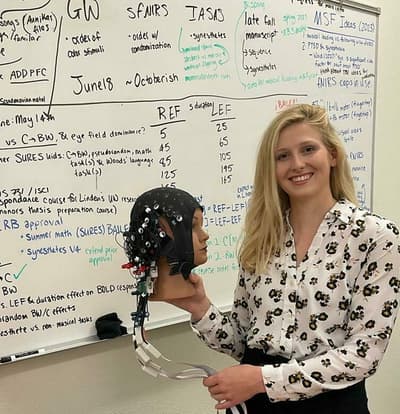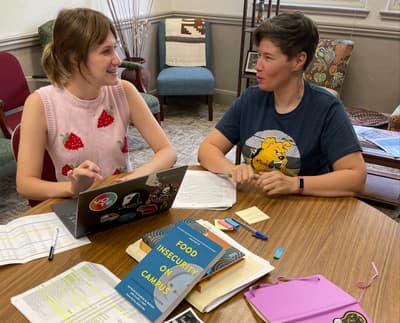As part of the upcoming Independent Colleges and Universities of Texas (ICUT) Undergraduate Research Day (UGRD) at the State Capitol in Austin, TLU’s Committee on Undergraduate Research, Scholarship, and Creative Activity (URSCA) has selected Linden Williamson as their 2023 Outstanding Undergraduate Researcher. The Integrated Science and Biochemistry double major will represent TLU on April 11 alongside other undergraduate researchers from across Texas.
This annual event showcases the experiences of undergraduate students engaged in research for Texas legislators and the public through high-quality poster displays. The program will highlight how research conducted by undergraduate students positively impacts Texas—and Texans—with the theme: Transforming Texas Through Undergraduate Research.
Up to 75 research projects will be displayed in poster format reflecting the work of numerous undergraduate students representing over 50 academic and health-related institutions across the state (both public and private/independent universities and colleges). Student participants and their faculty advisors will have the opportunity to tour the Capitol, attend committee hearings and observe the daily meeting of the Senate and/or House of Representatives. Student participants are also encouraged to work with their institution in scheduling meetings with their respective legislators.

Williamson’s research project, “Behavioral and brain measures corroborate chromesthesia: A case study,” will be on display, and she will be accompanied by her faculty mentor and TLU Psychology Professor Dr. Scott Bailey. Williamson said the ability to complete this level of faculty-led research as an undergraduate and TLU’s reputation in the STEM fields are why she decided to attend.
“As an aspiring physician, I highly valued the ability to complete faculty-led research in my college search,” she said. “When I was applying for college, I saw that TLU had recently received a five-year National Science Foundation grant to provide summer undergraduate research opportunities in STEMP academic fields. This rare opportunity—and the chance to work one-on-one with faculty mentors—is why I choose TLU. Now, as a third-year Bulldog, I know that I made the right choice of schools.”
While she says she can't choose a favorite part of conducting research at TLU, Williamson feels lucky to work with faculty who are experts in their fields.
“The ability to collaborate with faculty members to perform interdisciplinary, meaningful research helps me to grow into a competent researcher,” she said. “Working with Dr. Kevin Tate and Dr. Scott Bailey on multi-year projects that culminated in regional and international conference presentations is a highlight of my career at TLU, and an example of faculty excellence. My success in research is entirely attributed to my faculty mentors who go above and beyond to facilitate meaningful learning experiences for their students. Few Texas universities offer undergraduate students the chance to work one-on-one with faculty, perform ground-breaking research, and travel nationally to professional meetings.”
In addition, the TLU URSCA committee also recognizes and commends the two outstanding runners-up:
- Caroline Hrncir, English and Communications Studies double major, Project: “Hunger Shame: Understanding Food Insecurity among TLU’s Student Body,” (Faculty Mentor: Dr. Lauren Shook)
- Gilberto Lara, Biochemistry major, Project: “The Snail Microbiome,” (Faculty Mentor: Dr. Robert Jonas)
Their work will be featured at the TLU Student Academic Symposium poster session on April 21 in the Jackson Park Student Activities Center.
Both Lara and Hrncir said the opportunities they’ve had with faculty-led research have shaped positively shaped their overall student experience.

“Working with Dr. Jonas gave me lab experience in a one-on-one atmosphere,” Lara said.
“Something significant about my summer research is that it was tailored to the interests I had, and Dr. Jonas was always providing me guidance. He would even take the entire research team out for Thursday socials to enjoy a good time. After graduation, I plan to work as a laboratory assistant for a bio-sampling company or pursue a research assistant position at the University of Texas San Antonio. Afterwards, I plan to pursue a Ph.D. in immunology and microbiology.”
Hrncir, an English and Communication Studies double major, said researching food insecurity strengthened her bond with campus, while also seeing how the project directly impacts her community.
“It’s given me a reason to care about our student body, and to keep helping them with the tools I have at my disposal," she said. “After graduation, I plan to go into resource conservation because it's directly beneficial to the people I'd be helping, and I currently have an internship with the Guadalupe Groundwater Conservation District. I want to help spread knowledge about water and resource conservation to people so we can preserve our planet.”
Vice Chair for the Council on Undergraduate Research Physics and Astronomy Division and TLU Physics Department Chair Dr. Toni Sauncy said the university has embraced a broad definition of what constitutes research to include the range of scholarship and creative activities practiced by faculty mentors.

“This means that students across campus have the opportunity to enrich their undergraduate experience by taking their classroom lessons to a deeper level, no matter what the subject,” she said. “TLU faculty understand that this is essential for our students. For many disciplines, participation in independent, faculty-mentored research activities is expected, whether the student is headed for the workplace or an advanced degree after graduation. One of the wonderful things that happens when students engage in deeper investigations guided by a faculty expert is the discovery of new interests and expanded possibilities for their futures. Research with a faculty mentor is a way to open doors and elevate our students to positions where they have opportunities that might not be otherwise available to them.”
